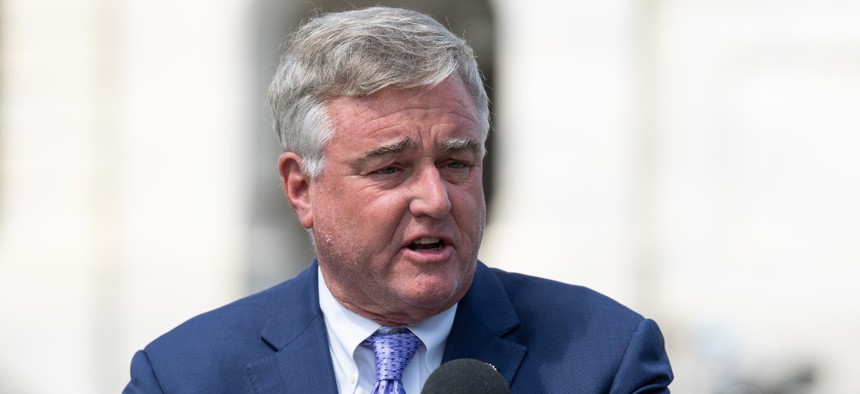
Rep. David Trone, D-Md., speaks at a press conference on the drug epidemic outside the Capitol in September. Trone is one of the lawmakers who wrote the letter. Bill Clark/CQ-Roll Call, Inc via Getty Images
Lawmakers Want the Head of the National Drug Policy Office Back in the Cabinet
A group of bipartisan, bicameral lawmakers is making this push ahead of President Biden’s State of the Union speech next week.
A bipartisan, bicameral group of lawmakers is urging President Biden to use his State of the Union address on February 7 to announce that he will reinstate the director of the national drug policy office as a Cabinet-level official, to bolster the response to the country’s drug crisis.
The leader of the Office of National Drug Control Policy was last a Cabinet-level position in 2009. The office, established in 1988 by a law that then-Senator Biden helped craft, coordinates policy across 19 agencies as well as develops and implements the national drug control strategy and budget. It is part of the whole-government approach to addressing drug addiction and overdose, according to its website.
“The drug overdose epidemic is one of our nation’s most pressing crises, claiming lives at an alarming rate,” wrote the lawmakers in a letter to President Biden on Wednesday. “Re-elevating [the drug control office] to the Cabinet will allow it to marshal the full resources of the federal government against this scourge of overdoses and demonstrate to the Congress and the American people your commitment to ending it.”
Rep. David Trone, D-Md., co-chair of the U.S. Commission on Combating Synthetic Opioid Trafficking; Sen. Ed Markey, D-Mass., a member of the commission; Reps. Brian Fitzpatrick, R-Pa., and Annie Kuster, D-N.H., Trone’s fellow co-chairs on the Bipartisan Mental Health and Substance Use Disorder Task Force; and 51 other members of Congress, signed onto the letter.
The lawmakers commended Biden for saying in his State of the Union last year that ending the opioid epidemic was a top priority for him and acknowledged the progress the country has made; however, they noted there is still a trend of rising overdose deaths.
“Giving the [drug control office] director the same stature as Cabinet members improves the director’s ability to collaborate with, and coordinate interagency strategies among equals,” said the letter, adding that the office touches on national security, law enforcement, public health and trade. “Having a Cabinet-level [drug control office] would also help ensure that drug policy is considered and prioritized across all policy discussions, accountability for performance is standardized across agencies involved in drug control activities, and the administration is prepared to zealously respond to trends in drug use and overdose.”
The bipartisan, bicameral U.S. Commission on Combating Synthetic Opioid Trafficking–which was established by the fiscal 2020 National Defense Authorization Act and has members from federal agencies, Congress and the private sector–also made this recommendation in a report issued last year. Similar calls have come from other members of Congress, advocacy groups and trade associations and treatment facilities since the position was downgraded in 2009, according to the lawmakers.
The late Orrin Hatch wrote in The San Diego Union Tribune in March 2009, when he was a sitting Republican senator from Utah, that the downgrade of the drug policy director “was a major departure from the precedent set in 1993 under President Clinton.” Hatch had previously served as chairman of the Senate Judiciary Committee and was a member of its crime and drugs subcommittee.
During the Trump to Biden presidential transition, former Office of National Drug Control Policy directors and officials (who served under Republican and Democratic administrations), along with other public health and substance abuse organizations, sent a letter to Biden and his transition team calling for the director position to be re-elevated.
The letter noted that during a confirmation hearing in October 2001 for John Walters, nominee for director of the Office of National Drug Control Policy, then-Senator Biden said, “I have argued that Cabinet-level status is necessary to give the position visibility commensurate with the depth of our nation's drug problem.” Biden also said he was glad that President George W. Bush “decided to make the drug czar a member of his Cabinet,” according to the hearing transcript.
The White House and the Office of Drug Control Policy did not respond for comment.







